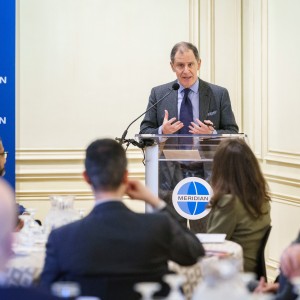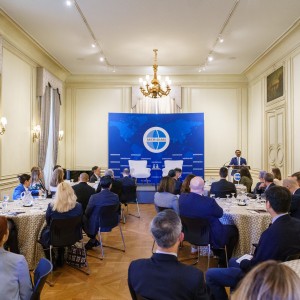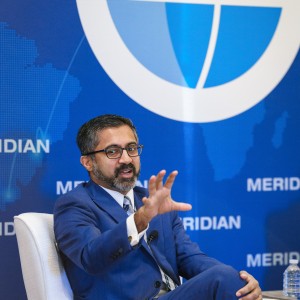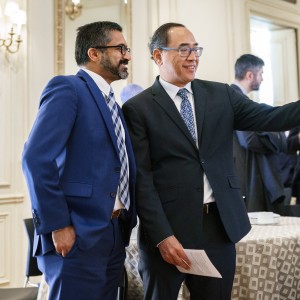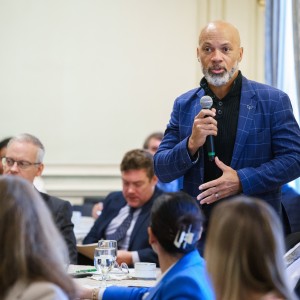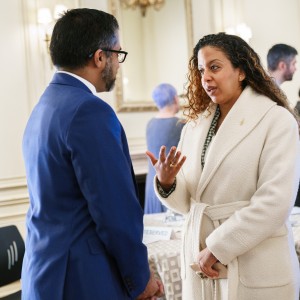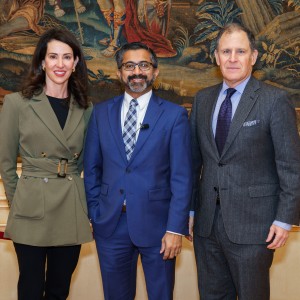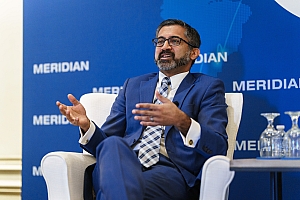Space, Diplomacy, and Beyond: Insights@Meridian with Chirag Parikh

In an era marked by rapid technological advancements in a globalized, interconnected world, the exploration and use of space has become increasingly prominent. Both nations and private entities alike are investing significantly in space exploration missions, satellite deployments, and advancements in space technology. This heightened focus on space activities not only fosters new scientific discoveries and expands our understanding of the universe, but also presents new opportunities for international collaboration, commercial ventures, and the potential for human settlement beyond Earth. Within this dynamic landscape, the significance of space diplomacy has become increasingly apparent, as fostering it is crucial for ensuring peaceful cooperation, preventing conflicts, and collectively addressing complex issues that transcend national boundaries.
On January 11, 2024, in partnership with USTelecom, Meridian hosted Chirag Parikh, Deputy Assistant to the President and Executive Secretary of the National Space Council at the White House, for an Insights@Meridian discussion moderated by Natalie Jones, Executive Vice President, Meridian on U.S. space diplomacy and the future of space exploration. Jonathan Spalter, President & Chief Executive Officer of USTelecom, delivered introductory remarks.
Here are some top takeaways from the program:
1. Space's Daily Influence on Our World
Despite its physical distance, space is an integral part of our daily lives, impacting everything from navigation, weather forecasts and transactions to global communications, national security, and scientific advancements. Space’s influence on our daily operations underscores the importance of understanding the entities involved in this vast realm. With over 80 nations and multinational corporations owning and operating satellites, it becomes crucial to understand the dynamics of space activities that shape our interconnected world. Space diplomacy is needed now more than ever to encourage international cooperation and agreements that help navigate the challenges and opportunities created by the exploration and use of outer space.
2. Space is the Great Enabler
Space exploration, while costly, is a catalyst for job creation, technological innovation, and the growth of industries related to aerospace and technology. In fiscal year 2021, NASA’s economic output was $71.2 billion, a remarkable threefold return on its annual budget. This impactful investment supported over 339,600 jobs nationwide and contributed to groundbreaking research that helped enhance life on Earth. NASA’s 2023 Spinoff Assessment highlights how their research led to crucial advancements, including ventilators for pandemic response, high-tech fabrics that help alleviate menopause symptoms, medical light therapy, and cutting-edge robotic technology capable of operating inside an MRI to treat brain tumors.
3. Commercial Space’s Meteoric Rise
The landscape of space exploration, once dominated by government initiatives, is undergoing a transformative shift in which private companies are driving the future of space. With commercial actors now contributing over 78% to the global space economy, they stand as leaders in innovation, fostering collaboration, and extending the industry's influence to unprecedented levels. Their proactive endeavors not only allow governments to allocate resources more efficiently without hindering innovation but also introduce healthy competition, resulting in cost reductions and a more sustainable trajectory for human presence in space. Yet, amidst these advancements, a crucial question looms: How do we guarantee that nations and private companies conduct space activities in a lawful, responsible, peaceful, and sustainable manner?
4. Maintaining Harmony in Orbit
As established spacefaring nations expand their activities in space, new spacefaring nations emerge, and private companies fuel a new space race, ensuring a sustainable future in space requires a collaborative and responsible approach. The Artemis Accords, a non-binding political agreement initiated by NASA and endorsed by a growing number of spacefaring nations, outline the first set of principles and guidelines to promote a sustainable and cooperative future in lunar exploration. While nations can align on overarching principles, signatories have yet to define the mechanisms by which this non-binding agreement will evolve into global norms and standards for space activities. The United States is dedicated to working with the Artemis Accords’ 33 signatories to establish these standards.
5. Launching U.S. Space Diplomacy
In an era where space plays an increasingly crucial role on the global stage, the U.S. government is taking strategic steps to bolster its international space leadership. On December 20, 2023, Secretary Antony Blinken announced the integration of a space expert into the U.S. Department of State’s Science Envoy Program. This announcement mirrors the objectives outlined in the State Department’s inaugural Strategic Framework for Space Diplomacy. The framework not only aims to equip U.S. diplomats worldwide with in-depth knowledge of space affairs but also underscores a commitment to fostering collaboration with regional allies for the peaceful use and exploration of outer space. One shining example of this commitment is the U.S.-Africa space partnership, which has encouraged space agencies in Africa to collaborate with NASA in addressing global challenges such as climate change and global food crises.
This program was made possible through the support of:

Project summary
| Space, Diplomacy, and Beyond: Insights@Meridian with Chirag Parikh | January 2024 | |
|---|---|
| Number of Attendees: | 40 |
| Regions: | Western Hemisphere |
| Impact Areas: | Science and Technology |
| Program Areas: | Diplomatic Engagement |
| Partners: | Diplomatic Corps, Private Sector, NGOs |
